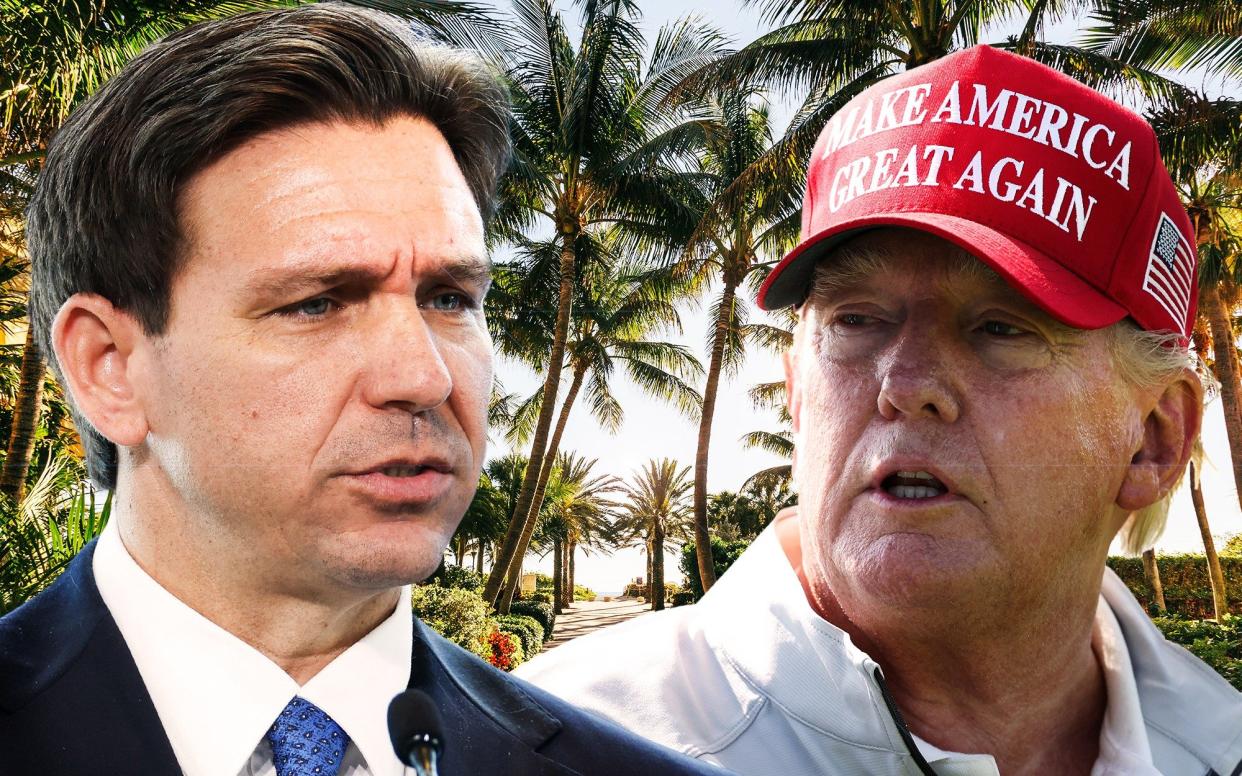How Florida became the key battleground in the Republicans’ fight for a leader

- Oops!Something went wrong.Please try again later.
- Oops!Something went wrong.Please try again later.
“Florida Man” is a popular internet meme from the 2010s. It’s a viral riff on the large number of newspaper headlines about wild Floridian males doing crazy stuff. “Florida Man threw live alligator in Wendy’s drive-thru window,” is one. “Florida man attempting to time travel crashes into strip mall,” is another.
These stories speak to the patronising way many Americans still think about the Sunshine State. Florida residents are thought to be past their prime, sun struck, high on drugs and more than a little mentally unwell.
“I like Florida,” said the great New York comedian George Carlin. “Everything is in the ’80s. The temperatures, the ages, and the IQs.”
In truth, however, it’s the joke that is getting old. Florida, America’s third most populous state, is increasingly rich and dynamic. It’s not just a sunny place for retirees: in recent years, hundreds of thousands of Americans of all ages have moved to Florida, often to escape the high-taxes, expensive housing and the suffocating progressivism of other states.
Americans take seriously their constitutionally enshrined right to pursue “life, liberty and happiness” – and Florida now has a reputation as being the place to do that.
But Florida is, like America, complicated. It has a huge Hispanic immigrant population – 5.5 million according to the latest census figures – and a lot of poverty as well as wealth.
Philip Bump, author of The Aftermath: The Last Days of the Baby Boom and the Future of Power in America, says that Florida’s racial diversity, warming climate, and ageing population make it “the state that looks most like most like what we'd expect the United States to look like in 2060.”

Florida is politically polarised, too, and therefore a key battleground in the nation’s all-consuming culture wars. And that’s why two Florida Men, Donald Trump and Ron DeSantis, are the front-runners to be the Republican Party's nominee in the presidential election next year. As one Republican consultant puts it, “2020 was, because of the pandemic, the Covid election. 2024 is shaping up, at least on the Republican side, to be the Florida election.”
Donald Trump is a New Yorker, but his spiritual home is his comedy mansion in Mar a Lago on the southern end of the Sunshine State. His famously orange 76-year-old face has a certain Floridian quality, too.
Ron DeSantis has been the Governor of Florida since 2018.
After months of anticipation, DeSantis announced his candidacy with Elon Musk on Twitter this week, and it all went disastrously wrong because the tech kept glitching. “Florida man wrecks presidential campaign in epic social media fail,” jokes one political insider.
Humour aside, the very fact that DeSantis is now mounting a credible challenge to Donald Trump – one backed by powerful figures such as Rupert Murdoch and Musk – speaks to his role in Florida’s transformation. Florida is traditionally a swing state in American elections.
In November, however, DeSantis won his gubernatorial re-election by a whopping 20 percentage points. Under DeSantis’s governorship, and in the age of Trump, the Grand Old Party has started to win in formerly Democratic Floridian strongholds such as Miami-Dade and Palm Beach.
“This is a very substantial development,” says Roger Stone, the famous 'dark arts' political consultant and Trump confidant. “And it's not just, as people like to say, because of conservative Cuban Hispanics. The Republican Party has made significant gains among Mexican Hispanics, Puerto Ricans and Venezuelan Hispanics.”
Who can be credited for Florida's rightward shift – Trump or DeSantis? That answer to that question may decide who ends up on the Republican presidential ticket in 2024.
DeSantis became Florida’s Governor in large part thanks to the power of Trump. He courted Trump’s endorsement by sucking up to him on Fox News. He even did a campaign advertisement in which he read Trump’s Art of the Deal book to his baby (“Then Mr Trump said, “You’re fired!”).
What DeSantis understood is that, for Floridians especially, Trump’s willingness to stick two fingers up to established Washington norms made him attractive.
Once installed as Governor, he made a global name for himself as a leader on the Right who wouldn’t back down when it came to culture war issues. “He doesn’t just talk the Trumpy talk,” says one Republican strategist. “He walks the walk. At 46, he’s also Trump but you get two terms.”

DeSantis distinguished himself most of all among liberty lovers during the pandemic. He was the first and most prominent state governor to buck the scientific orthodoxy on Covid and allow Floridian businesses and society to open again. This was a boon to Florida’s economy and enhanced its reputation as a state where freedom thrives.
He dared to pick a fight with Disney, the corporate monolith, over his Parental Rights in Education Act, which banned Floridian school teachers from discussing their sexuality with pupils. A number of employees at Disney, which owns a massive and extremely profitable theme-park in Florida, were disgusted by what was dubbed the “Don't Say Gay Bill.”
The corporation duly released a statement calling “for this law to be repealed by the legislature or struck down in the courts.” DeSantis responded by passing another law terminating Disney World's 'special district' tax status in Florida.
Some right-wing Republicans squealed at the escalation, because free-market Republicans aren’t meant to use state power to intimidate private companies. It’s un-American. But DeSantis has continued to fight Disney through Florida’s courts.
DeSantis has also challenged progressive Floridian school boards – banning mathematics textbooks which promote Critical Race Theory, among other moves. He’s signed a bill forbidding transgender athletes from women and girls’ school teams. He’s signed a bill banning abortions after six weeks.
These moves provoke howls of outrage from the left-liberal media, yet that only increases his standing in the wider electorate. “We have battled the woke elites in Florida,” DeSantis writes in his flagrantly political memoir The Courage to Be Free. “And we have won, time and again.” One of his mantras is that Florida is “the place where woke goes to die”.

Roger Stone, a fierce Trump loyalist, argues that DeSantis’s popularity as a culture warrior is much exaggerated. “He’s been very aggressive on cultural issues and that has had a polarising effect in Florida. In fact I would say that, although people talk about Florida as a Republican red state, it is in fact a purple state — meaning it’s still in play.”
Stone says that DeSantis’s backers have misunderstood the more “populist aspects of Trump’s appeal.” He points out that Trump has always mixed his culture warring with economic policies that appeal to working-class voters.
One of the Trump campaign’s already established attack lines is to put out that the Floridian Governor wants to cut social security and Medicare, government welfare policies that benefit America’s lower-income and older voters most.
“Ron DeSantis loves sticking his fingers where they don't belong,” says one bizarrely nasty Trumpian video advertisement, which mocks DeSantis over a silly story that he ate a chocolate pudding on a plane with his hands in 2019. “DeSantis has his dirty fingers all over senior entitlements.”

DeSantis has said that, as Governor of Florida, “I have more seniors here than just about anyone” and denies he has any plans to cut their entitlements. But his voting record shows he has supported reforms to social security and the dirty fingers line might stick — not just in Florida but across America, and especially in the early primary voting states of Iowa, South Carolina, Nevada and New Hampshire.
The argument for DeSantis is that he could be a Floridian version of Ronald Reagan, who went from being a sunny governor of California to one of the most loved Republican presidents.
The argument against DeSantis is that he’s more likely to be the next Jeb Bush, another successful Floridian Governor who big donors backed to win the Republican nomination in 2016 — only for him to be monstered by Donald Trump in the primaries.
DeSantis, whose mother was a nurse, is a much grittier politician than Jeb Bush, whose father was a president. He understands that Republican politics is now geared towards the working class.

But he could have a personality problem. He’s gauche in interviews and awkward in public. A video of him fake laughing in Iowa last week went viral, as commenters compared him to a “faulty robot.” He doesn't have the presidential magic touch with people — which other governors-turned-Presidents, such as Bill Clinton or Reagan or even Jimmy Carter possessed. Or, as Stone puts it, “I knew Ronald Reagan. I worked for Ronald Reagan. Ron DeSantis is no Ronald Reagan.”
DeSantis’s polls ratings have been sliding in recent weeks. It turns out that his much hailed “Florida blueprint” — Make America Florida, it’s been called — isn’t what all Americans want.
Arguably the strongest case against DeSantis’s candidacy is that, even in his home state, the polls suggest he’ll lose to Trump. “Orange Florida Man Beats Robot Florida Governor In Backyard” — that could be the Republican headline for 2024.

